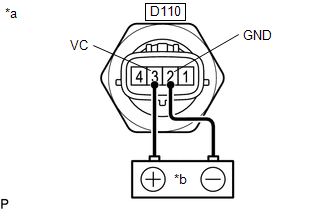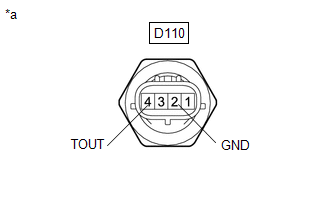Toyota Yaris: Oil Pressure And Temperature Sensor / Inspection
INSPECTION
PROCEDURE
1. INSPECT OIL PRESSURE AND TEMPERATURE SENSOR
(a) Check the oil pressure and temperature sensor output voltage.
| (1) Apply 5 V between terminals 3 (VC) and 2 (GND). NOTICE:
HINT: If a stable power supply is not available, connect 4 nickel-metal hydride batteries (1.2 V each) or equivalent in series. |
|
| (b) Measure the voltage between terminals. Standard Voltage:
*: The output voltage changes depending on the voltage applied to the terminals. If the result is not as specified, replace the oil pressure and temperature sensor. |
|
 Removal
Removal
REMOVAL PROCEDURE 1. REMOVE NO. 1 ENGINE UNDER COVER ASSEMBLY Click here
2. REMOVE OIL PRESSURE AND TEMPERATURE SENSOR (a) Disconnect the oil pressure and temperature sensor connector...
 Installation
Installation
INSTALLATION PROCEDURE 1. INSTALL OIL PRESSURE AND TEMPERATURE SENSOR (a) Apply adhesive to 2 or 3 threads of the oil pressure and temperature sensor...
Other information:
Toyota Yaris XP210 (2020-2026) Reapir and Service Manual: Components
C..
Toyota Yaris XP210 (2020-2026) Reapir and Service Manual: Lost Communication With ECM/PCM "A" Missing Message (U010087,U012987,U014087)
DESCRIPTION These DTCs are stored when a malfunction occurs in the CAN communication circuit. DTC No. Detection Item DTC Detection Condition Trouble Area U010087 Lost Communication With ECM/PCM "A" Missing Message When the stereo component equalizer assembly detects a CAN communication malfunction in the engine system for 1 second or more continuously 3 seconds after the ignition switch is turned to ON* CAN communication system U012987 Lost Communication With Brake System Control Module Missing Message When the stereo component equalizer assembly detects a CAN communication malfunction in the brake system for 1 second or more continuously 3 seconds after the ignition switch is turned to ON* CAN communication system U014087 Lost Communication with Body Control Module Missing Message When the stereo component equalizer assembly detects a CAN communication malfunction in the main body ECU for 3 seconds or more continuously 3 seconds after the ignition switch is turned to ON* CAN communication system HINT: *: Malfunction monitoring is not performed under the following conditions, in order to prevent erroneous detection...
Categories
- Manuals Home
- Toyota Yaris Owners Manual
- Toyota Yaris Service Manual
- Engine Start Function When Key Battery is Dead
- Fuel Gauge
- Power Integration No.1 System Missing Message (B235287,B235587,B235787-B235987)
- New on site
- Most important about car
Fuel-Filler Lid and Cap
WARNING
When removing the fuel-filler cap, loosen the cap slightly and wait for any hissing to stop, then remove it
Fuel spray is dangerous. Fuel can burn skin and eyes and cause illness if ingested. Fuel spray is released when there is pressure in the fuel tank and the fuel-filler cap is removed too quickly.


